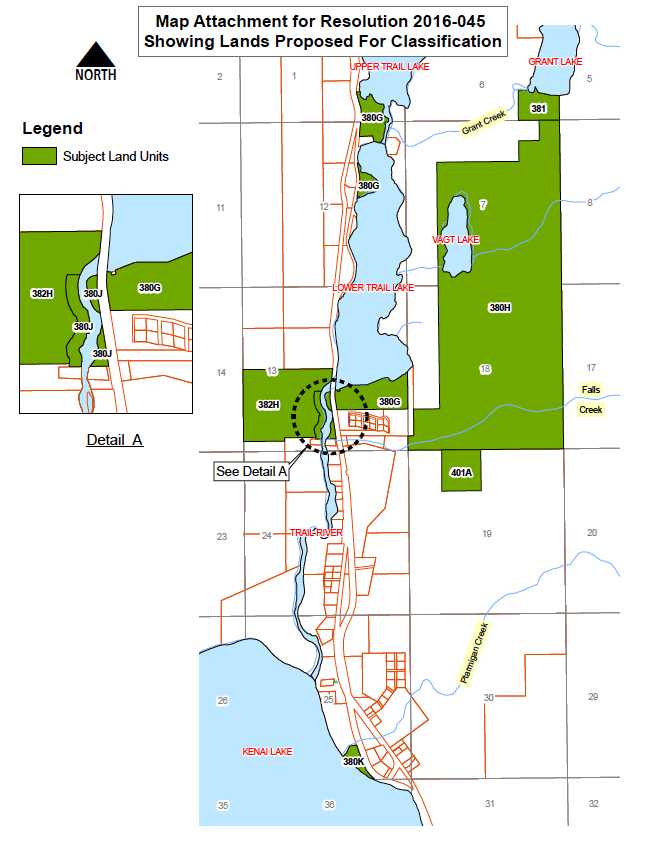More than 1,000 acres of borough land near Crown Point will now be classified as recreational.
The land, a variety of parcels in the Crown Point area and to the south and east of Lower Trail Lake on the Seward Highway, became borough property from the state through the municipal entitlement grant in February 2015. People use the land now to hike, pick berries and access Lower Trail Lake and Kenai Lake, among other uses.
The land was conditionally approved for the grant as long as the borough classifies the lands as recreational, according to a memo from borough Land Management Officer Marcus Mueller to the Kenai Peninsula Borough Assembly. The assembly passed a resolution changing the classification at its Tuesday meeting.
A recreational classification designates an area where the potential for recreational use exists, such as gun ranges, archery ranges, camping, golf courses, trails, boating, fishing or other types of activities, except for amusement parks, according to borough code. The code also stipulates that if the land is disposed of to a private party, the owner must provide for public use unless prohibited by ordinance.
Most of the acreage falls in an area east of Lower Trail Lake, but some parcels are isolated — several on the west side of Lower and Upper Trail Lakes near the highway, along the shores of Trail River and another abutting Kenai Lake where Ptarmigan Creek drains into the lake. Altogether, the reclassification covers 1,186 acres.
The lands department reviewed the historical importance, use and ownership of the lands, among other factors, in its recommendation. Some of the land borders the Alaska Railroad or private property; other parts of it have historical importance, such as the parcel on the shore of Kenai Lake, which is the lakeside site of Alaska Nellie’s Homestead. The historic Iditarod Trail also passes through the property, according to the staff report.
The staff concluded that the all the land is well suited for public recreation and recommended the assembly pass the recreational classification.
The assembly passed the resolution on its consent agenda after discussion in the lands committee earlier in the day Tuesday. The only outright objection to the reclassification came from a pair of private landowners who own land on the northern shore of Lower Trail Lake, who wrote a letter to the assembly expressing concerns about trespassers and vandalism on their property if the land were reclassified and opened to more public use.
David and Michael Bryson wrote that they would have preferred the land remain under state control, but if it must be conveyed to borough, the recreational classification seems to be the least detrimental.
“Our attempts to deter trespassers in the most part have been unsuccessful with our posted signage being torn down, shot at, and/or totally ignored,” the Brysons’ letter states. “We’ve experienced fire pits throughout the property in which we constantly have to dismantle, the cabin gets broken into and vandalized along with any property we leave in there by unwanted visitors. The banks of the lake have eroded due to the unwelcomed foot traffic up and down causing a loss of sevaral feet of land overlooking the lake.”
The Alaska Railroad Corporation also expressed concerns about trespassing. The railroad tracks run through the area, which the railroad has a right-of-way for and private landowners have to request permits to cross. There are already existing trespassing and safety issues with the railroad’s right of way, which the reclassification could exacerbate, the corporation’s letter states.
The corporation suggested the borough take over responsibility for the already-existing railroad crossings with one blanket crossing permit and cooperating with the Alaska Railroad Corporation to move the access road and parking for the south shore of Lower Trail Lake to the recreational land, away from the railroad.
“Give the serious nature of ongoing trespass in this area, additional trespass mitigation measures beyond those described above may be required to dissuade recreational users from unauthorized crossing or use of the (Alaska Railroad Corporation) right-of-way,” the corporation’s letter states.
The Alaska Department of Environmental Conservation asked the borough to use best management practices where equipment storage, maintenance and operation or other potential sources of contamination are close to public water systems, which run beneath the land north and adjacent to Kenai Lake.
The Alaska Department of Fish and Game Habitat Biologist Marla Carter commented that the department did not object to the recreational classification, but had a few stipulations. One is that borough enforce codes to maintain fish and wildlife habitat, minimize erosion and sedimentation and regulate activity along the water bodies while preserving public access. The department also asked that activities that could impact water bodies, such as gun ranges or golf courses, be prohibited, that new trails and campgrounds take possible bear interactions into account and that Fish and Game be consulted on projects that could impact the riparian resources.
“(Fish and Game) continues to believe that these lands should remain mostly undeveloped in order to protect the fish and wildlife resouces within them, to minimize potential negative wildlife encounters, and to continue to provide the recreational experiences that the area is currently known for,” Carter wrote in the letter.
Reach Elizabeth Earl at elizabeth.earl@peninsulaclarion.com.


